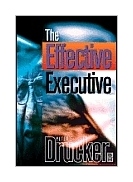|
||
• wydawnictwa polskie
• Zamów informacje o nowościach z wybranego tematu • kontakt
• Cookies na stronie |
EFFECTIVE EXECUTIVEDRUCKER P.wydawnictwo: ELSEVIER , rok wydania 1996, wydanie Icena netto: The measure of the executive, Peter Drucker reminds us, is the ability to 'get the right things done'. Usually this involves doing what other people have overlooked, as well as avoiding what is unproductive. He identifies five talents as essential to effectiveness, and these can be learned; in fact, they must be learned just as scales must be mastered by every piano student regardless of his natural gifts. Intelligence, imagination and knowledge may all be wasted in an executive job without the acquired habits of mind that convert these into results. One of the talents is the management of time. Another is choosing what to contribute to the particular organization. A third is knowing where and how to apply your strength to best effect. Fourth is setting up the right priorities. And all of them must be knitted together by effective decision-making. How these can be developed forms the main body of the book. The author ranges widely through the annals of business and government to demonstrate the distinctive skill of the executive. He turns familiar experience upside down to see it in new perspective. The book is full of surprises, with its fresh insights into old and seemingly trite situations.
Peter Drucker , Clarke Professor of Social Science, Peter F Drucker Graduate Management School, Claremont Graduate University, California 148 pages Księgarnia nie działa. Nie odpowiadamy na pytania i nie realizujemy zamówien. Do odwolania !. |


